#ICRA2022 networking events
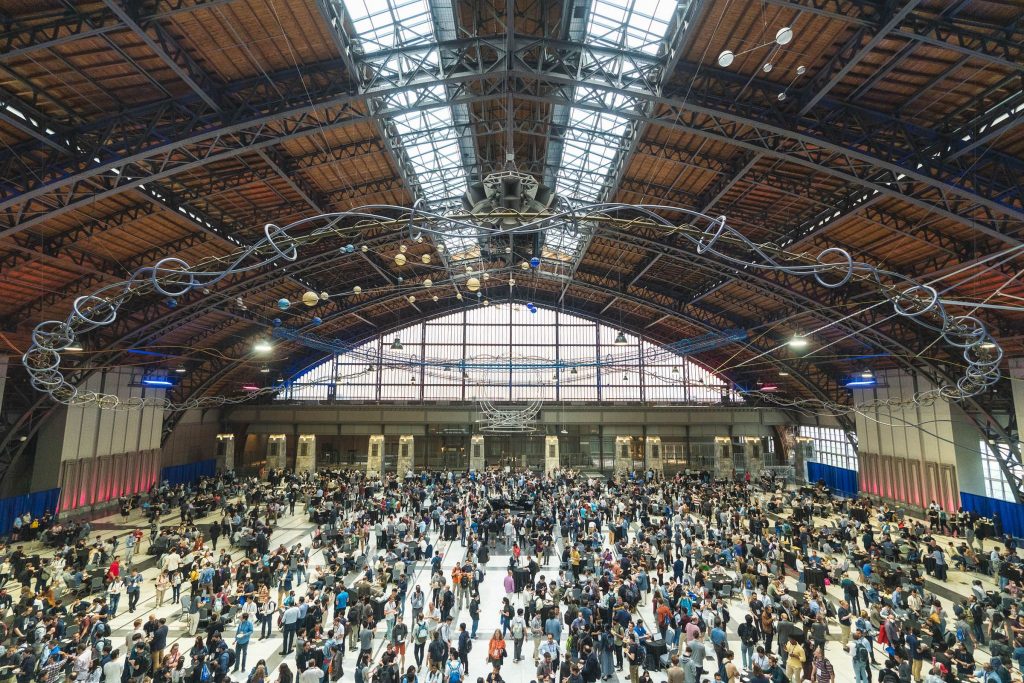
Photo credits: Wise Old Multimedia
IEEE International Conference on Robotics and Automation (ICRA) has given many opportunities over the years for researchers, industries, students and the enthusiasts to network and collaborate. In a similar fashion, this year in 2022, there were great number of opportunities to involve and engage as well including networking events.
A week before the conference, IEEE Robotics and Automation Society, Women in Engineering (RAS WiE) organized a free virtual event for the enthusiasts from the robotics research field to learn and discuss the aspects of Becoming a Plenary/Keynote Speaker in an International Robotics Conference. Three extraordinary robotics researchers, Dr. Vandi Verma, NASA Jet Propulsion Laboratory, USA, Dr. Katherine Kuchenbecker, Director, Haptic Intelligence Department, Max Planck Institute for Intelligent Systems, Germany and Prof. Lydia Kavraki, Greek-American computer scientist, the Noah Harding Professor of Computer Science, a professor of bioengineering, electrical and computer engineering, and mechanical engineering, Rice University discussed their career paths, opportunities and difficulties they’ve faced along their journey as a woman in engineering, mentoring, STEM promotion and work-life balance. The panelists also shared their invaluable personal experience and discussed the importance of learning together. The event was remarkable.
There were a lot of in-depth discussions duing the workshop. We discussed the importance of practicing a talk as a way of respecting the audience during conferences, advocating for others as we never know who out there is reflecting themselves on us and that how if we have no paper rejected, we are probably playing it too safe. Further, we also discussed about finding one’s niche and being the best at it. The idea of an aliveness detector was extra-ordinary. The concept behind the aliveness detector is that it is described as the key to understand why you like what you like, or what makes you feel alive, and having the curiosity to explore and connect your questions to the known knowledge. The workshop ended with other researchers and participants introducing themselves to the audience and thereby getting both exposure and growing network.
While I couldn’t make it to in-person networking events, the following networking events were hosted and turned out to be a tremondous success indeed.
- Social Hour Hosted by the RAS Student Activities Committee
- US Black in Robotics (BiR)
- RAS Women In Engineering (WIE) Networking Apéro Event on The Benefits of Diversity in Research Teams
- ICRA Welcome Reception
- ICRA 2022 Dinner Reception
- RAS Booth at ICRA
Human-centred mechanism design with Democratic AI
Human-centred mechanism design with Democratic AI
ROS Awards 2022 results
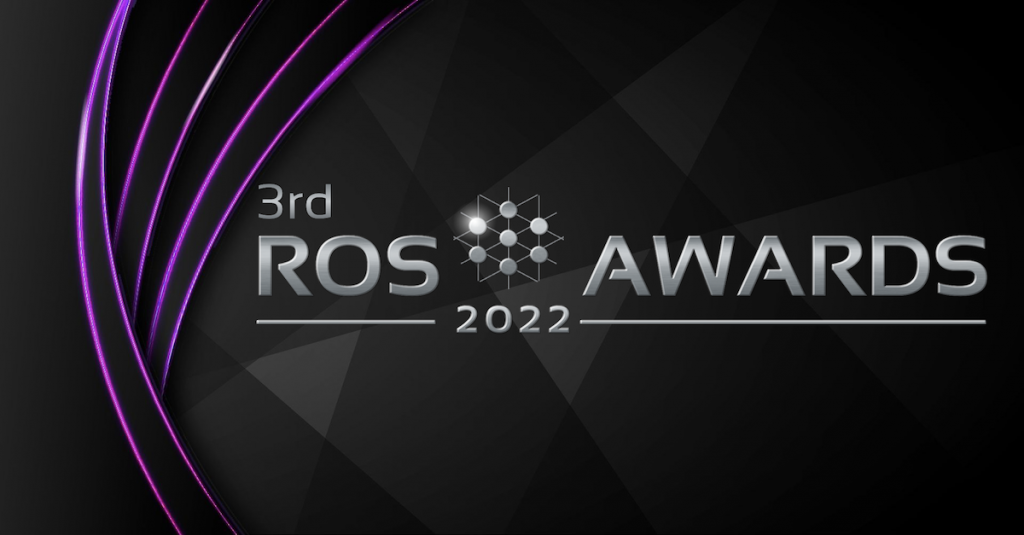
The ROS Awards are the Oscars of the ROS world! The intention of these awards is to express recognition for contributions to the ROS community and the development of the ROS-based robot industry, and to help those contributions gain awareness.
Conditions
- Selection of the winners is made by anonymous online voting over a period of 2 weeks
- Anybody in the ROS community can vote through the voting enabled website
- Organizers of the awards provide an initial list of 10 possible projects for each category but the list can be increased at any time by anybody during the voting period
- Since the Awards are organized by The Construct none of its products or developers can be voted
- Winners are announced at the ROS Developers Day yearly conference
- New on 2022 edition: Winners of previous editions cannot win again, in order to not concentrate the focus on the same projects all the time. Remember, with these awards, we want to help spread all ROS projects!
Voting
- Every person can only vote once in each category
- You cannot change your answers once you have submitted your vote
- Voting is closed 3 days before the conference, and a list of the finalists per each category is announced in the same week
- Voters cannot use flaws in the system to influence voting. Any detection of trying to trick the system will disqualify the votes. You can, though, promote your favorite among your networks so others vote for it.
Measures have been taken to prevent as much as possible batch voting from a single person.
Categories
Best ROS Software
The Best ROS Software category comprises any software that runs with ROS. It can be a package published on the ROS.org repo of just a software that uses ROS libraries to produce an input. Open Source and closed source are both valid.
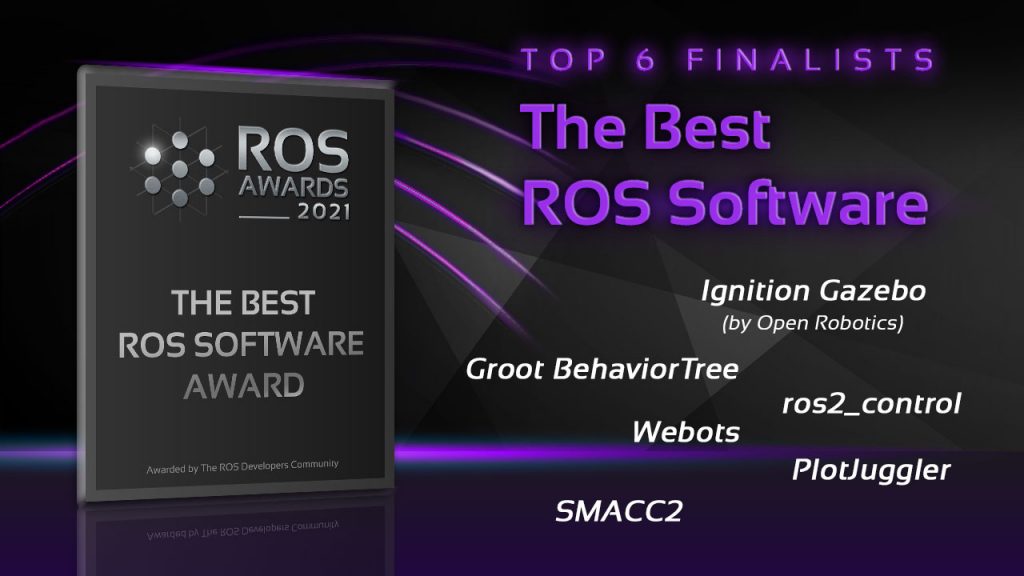
Finalists
- Ignition Gazebo, by Open Robotics
- Groot Behavior Tree, by Davide Faconti
- Webots, by Cyberbotics
- SMACC2, by Brett Aldrich
- ros2_control, by several ROS developers
- PlotJuggler, by Davide Faconti
Winner: Webots, by Cyberbotics
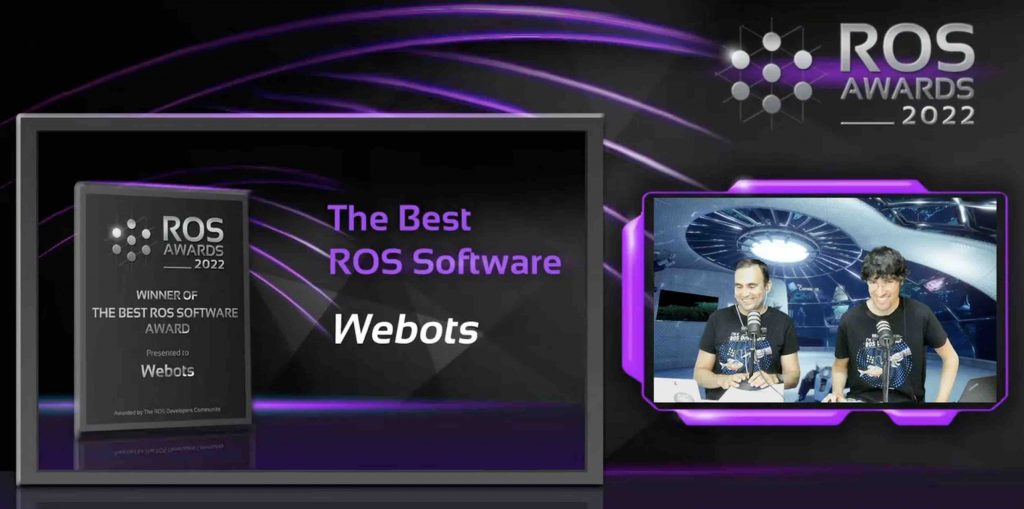
Learn more about the winner in this video:
Best ROS-Based Robot
The Best ROS-Based Robot category includes any robot that runs ROS inside it. They can be robotics products, robots for research, or robots for education. In all cases, they must be running ROS inside.
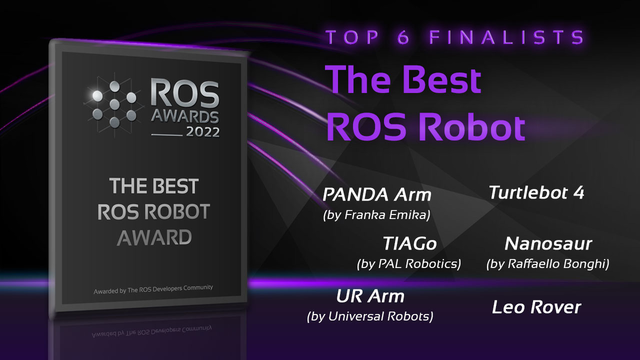
Finalists
- Panda robot arm, by Franka Emika
- TIAGo, by Pal Robotics
- UR robot arm, by Universal Robots
- Turtlebot 4, by Clearpath
- Nanosaur, by Raffaello Bonghi
- Leo Rover, by Leo Rover
Winner: Nanosaur, by Raffaello Bonghi
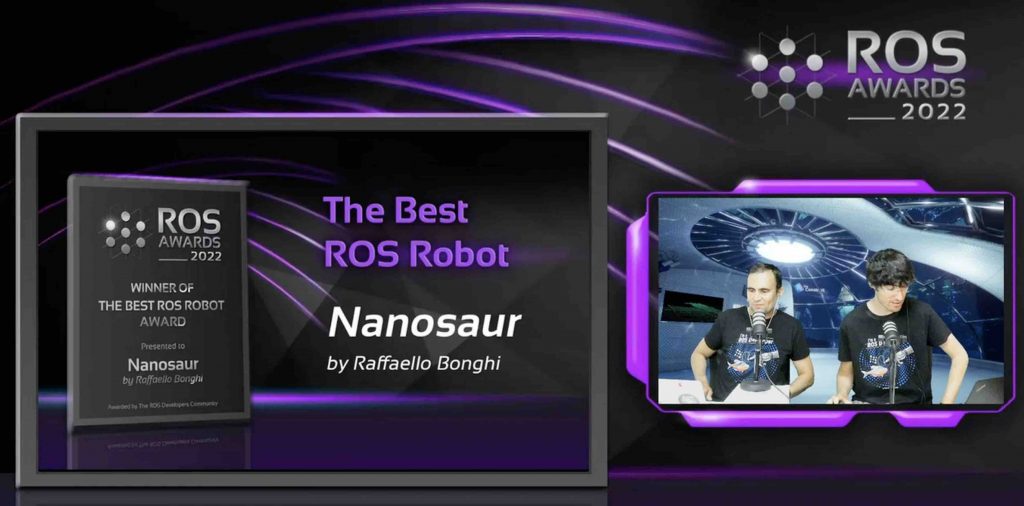
Learn more about the winner in this video:
Best ROS Developer
Developers are the ones that create all the ROS software that we love. The Best ROS Developer category allows you to vote for any developer who has contributed to ROS development in one sense or another.
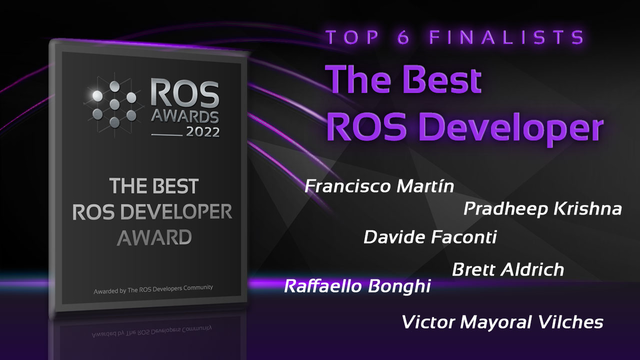
Finalists
- Francisco Martín
- Davide Faconti
- Raffaello Bonghi
- Brett Aldrich
- Victor Mayoral Vilches
- Pradheep Krishna
Winner: Francisco Martín
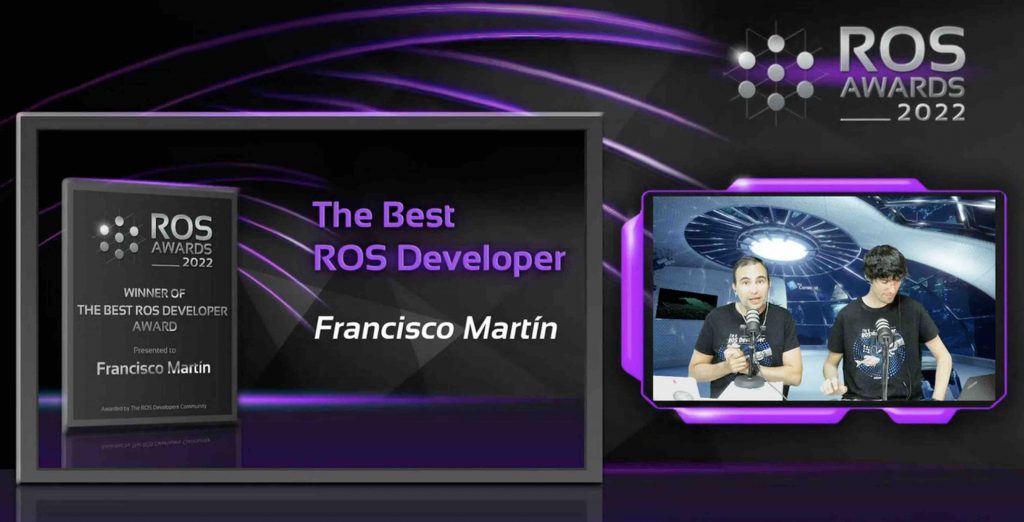
Learn more about the winner in this video:
Insights from the 2022 Edition
- This year, the third time we organise the awards, we have increased the total number of votes by 500% So we can say that the winners are a good representation of the feelings of the community.
- Still this year, the winners of previous editions received many votes. Fortunately, we applied the new rule of not allowing to win previous winners, to provide space for other ROS projects have the focus on the community, and hence help to create a rich ROS ecosystem.
Conclusions
The ROS Awards started in 2020 with a first edition where the winners were some of the best and well-known projects in the ROS world. In this third edition, we have massively increased the number of votes from the previous edition. We expect this award will continue to contribute to the spreading of good ROS projects.
See you again at ROS Awards 2023!
ep.357: Origin Story of the OAK-D, with Brandon Gilles
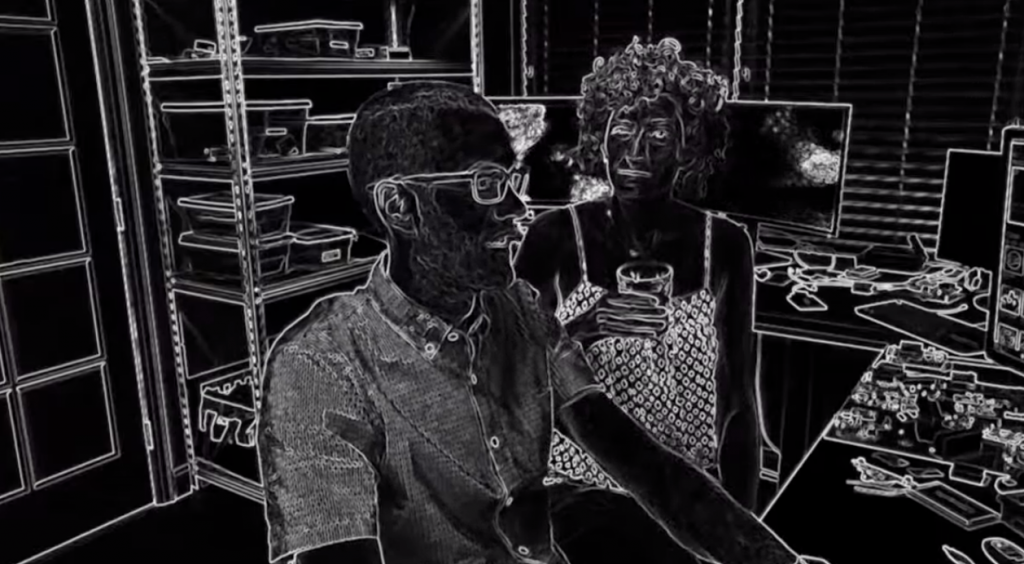
Brandon Gilles, Founder and CEO of Luxonis, tells us his story about how Luxonis designed one of the most versatile perception platforms on the market.
Brandon took the lessons learned from his time at Ubiquiti, which transformed networking with network-on-a-chip architectures, and applied the mastery of embedded hardware and software to the OAK-D camera and the broader OAK line of products.
To refer to the OAK-D as a stereovision camera tells only part of the story. Aside from depth sensing, the OAK-D leverages the Intel Myriad X to perform perception computations directly on the camera in a highly power-efficient architecture.
Customers can also instantly leverage a wide array of open-source computer vision and AI packages that are pre-calibrated to the optics system.
Additionally, by leveraging a system-on-a-module design, the Luxonis team easily churns out a multitude of variations of the hardware platform to fit the wide variety of customer use cases. Tune in for more.
Brandon Gilles
Brandon Gilles is the Founder and CEO of Luxonis, maker of the OAK-D line of cameras. Brandon comes from a background in Electrical and RF Engineering. He spent his early career as a UniFi Lead at Ubiquiti, where his team helped bring Ubiquiti’s highly performant and power-efficient Unifi products to market.
Links
- Download mp3
- Subscribe to Robohub using iTunes, RSS, or Spotify
- Support us on Patreon